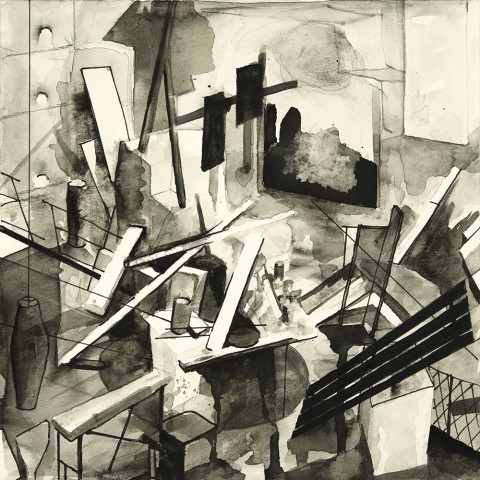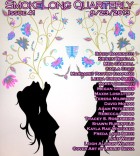With the sharp end of a steak knife, Rachel punctures the clear film on a tray of frozen lasagna. Pierce to vent, the instructions read. The knife has a smooth black handle and a serrated blade. It’s a serious knife, from a set of serious knives, each with a dedicated purpose—filleting a fish, paring an apple, slicing bread. The set, minus the steak knife, belongs to her father.
As the lasagna heats in the microwave, Rachel stands by and watches the turntable rotate, her dinner glowing and spinning on a small glass stage. She isn’t one for sentimentality, so doesn’t think about her father every time she uses the knife. She is stoic as she places it back in the silverware drawer, next to a rolling pin with splintered wooden handles.
Stoic is a word Rachel doesn’t use to describe herself, but she used it in a poem once, to describe a pair of Levi’s jeans. Her classmates in the poetry workshop, where she’d presented the piece for discussion, weren’t impressed. It sparked a debate about the emotional qualities of denim, most of the students adamant that clothing wasn’t even capable of feeling.
But what about the pale blue blouse Rachel wore when she was seventeen? The one her high school boyfriend unbuttoned in the dark of his uncle’s garage. She was sure it felt something as it slid from her shoulders and onto the floor. Those cotton fibers had been alive once, just like the nerve fibers in her father’s feet—those once raw bundles of cords, circuits that used to feel something, everything.
While he was dying, Rachel’s father watched the shop-from-home channel on television. He didn’t sleep much, due to the constant tingling in his feet, a side effect from the chemo. There was always something useful to buy on the screen, so he kept his wallet on the end table, next to the cordless phone. It was the same phone Rachel had in her bedroom in junior high—beige plastic with a collapsing metal antenna. The 6 key was nearly worn out, 6 having been the first number in the local exchange, all those years of Rachel’s girl fingers dialing.
While he was dying, Rachel’s father acquired a collection of products, everything still in shipping boxes stacked around his rented oxygen tank. There were the serious knives layered in tissue paper. There were hand-painted dog figurines and therapeutic socks that improve your circulation. There was a cooler that plugs into your car’s cigarette lighter and a flashlight that doesn’t use batteries—you charge it by shaking it the way you shake a can of soda, hoping it will explode when you pop the tab.
Weeks after her father died, when assorted cousins circled the contents of the house like seagulls above a bag of bread, it was the single steak knife Rachel wanted, the only thing she took. She slid it in her purse when no one was looking.
The microwave beeps and Rachel opens its small door. She places the steaming square of lasagna on the kitchen table, where its heat will create a circle of condensation. The telephone rings, and she pictures her father in the middle of the night, calling in an order for serious knives. The thought exists for a moment before Rachel makes it dissolve, saving it instead for those seconds before sleep, when the circuits in her brain are alive with the possibility of dreams that feel like falling or flying. She never could tell the difference.



 The SmokeLong Grand Micro Contest (The Mikey) is now an annual competition celebrating and compensating the best micro fiction and nonfiction online.
The SmokeLong Grand Micro Contest (The Mikey) is now an annual competition celebrating and compensating the best micro fiction and nonfiction online.